How Can I Protect My Phone from Hackers | Ultimate 2025 Guide
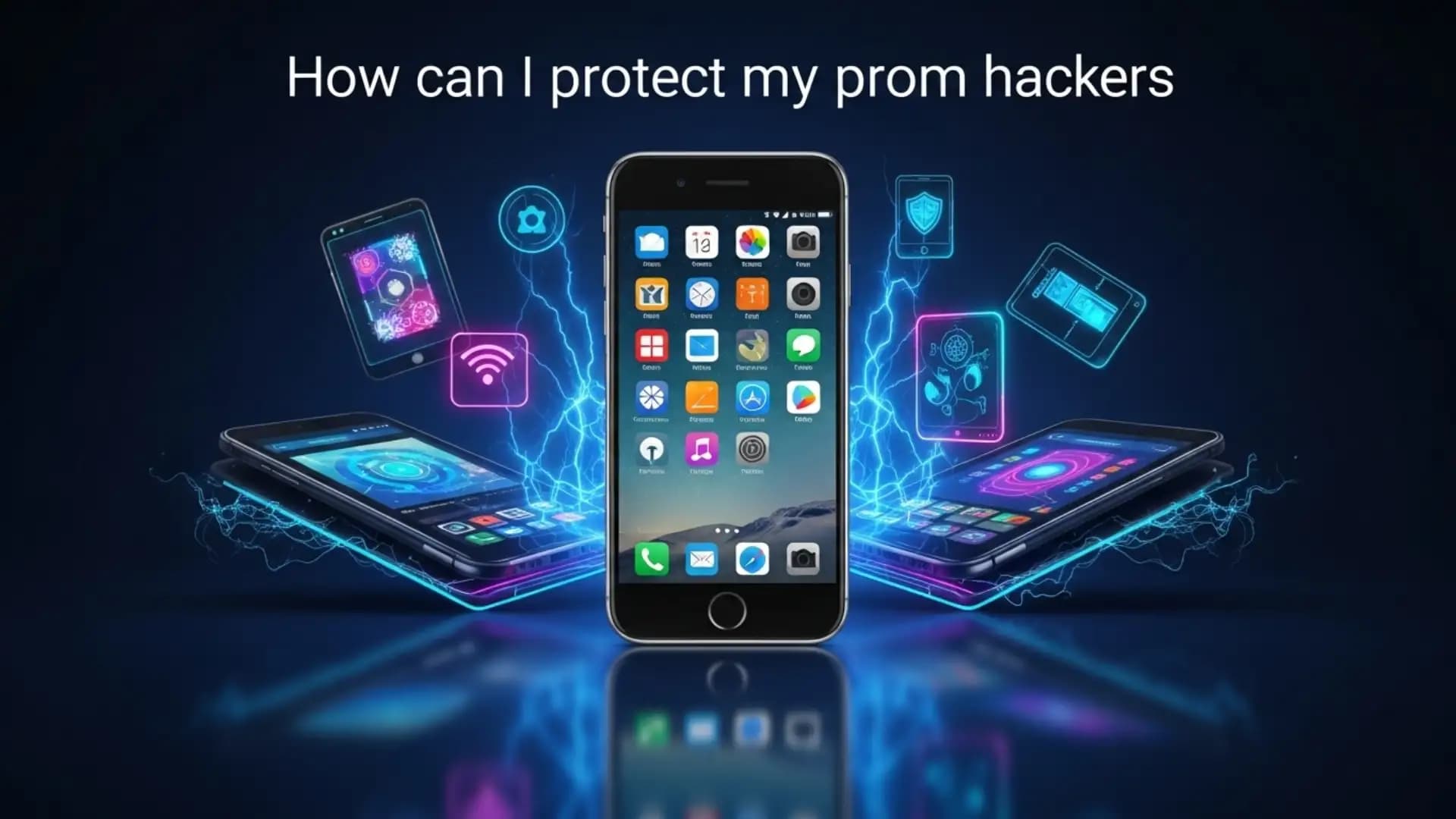
Hoplon InfoSec
01 Nov, 2025
How much of your life would go with your phone if it disappeared tomorrow? That little glass rectangle holds all of your photos, bank apps, messages, passwords, and even your ID. That's why so many people are asking the same important question: how can I keep hackers from getting into my phone?
That question isn't just for people who are good with technology anymore in 2025. It's for everyone who has a smartphone, which is pretty much everyone. Mobile security has become one of the most important issues for personal safety in our time, without anyone really noticing.
This guide shows you how to keep your Android or iPhone safe from hackers, thieves, and data breaches in the real world. No fear tactics, no technical language, just simple steps to make your online life safer.
Why it's more important than ever to keep your phone safe
Phones have changed into portable computers that are faster, smarter, and more connected. That also means that cybercriminals are now going after them.
Cybersecurity experts said in a report from 2025 that mobile malware attacks rose by almost 40% in just a year. A fake Wi-Fi network or a rogue app that looks like a photo editor can now do what used to take a phishing email or an infected USB stick.
Once a hacker gets in, they can:
• Read your emails or messages
• Steal your payment information or cryptocurrency
• Track your location in real time
• Clone your SIM card
• Take over your online accounts
The scary part? Most people don't even know it's happening until it's too late.
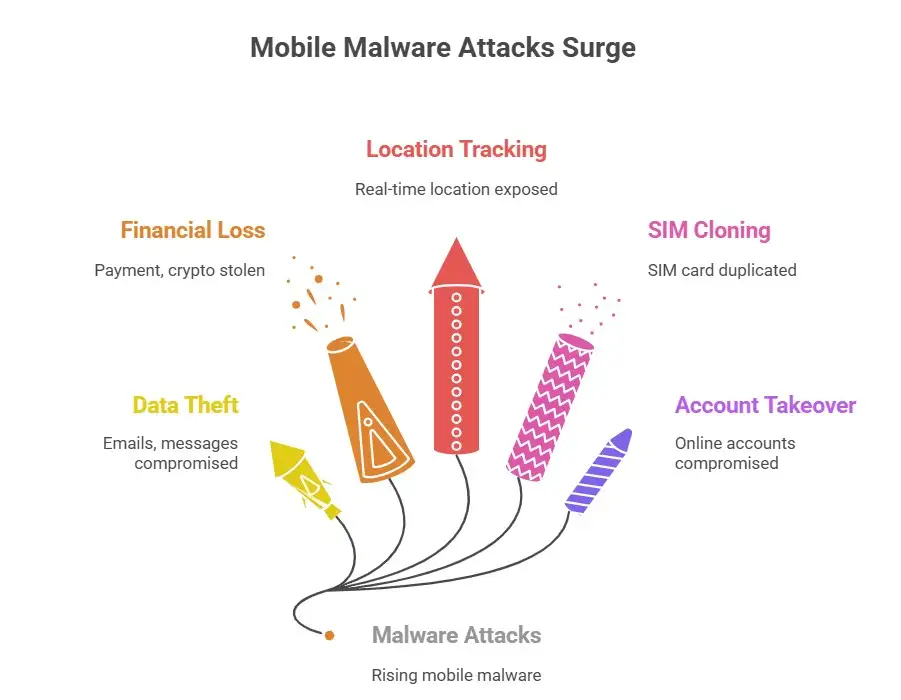
Signs that your phone may have been hacked
You need to recognize the warning signs before you can defend yourself. Hackers don't usually announce their presence; they blend in.
Here are some warning signs that something is wrong:
• The battery runs out of power faster than normal. Spyware that is hidden often runs all the time in the background.
• Data spikes that happen out of the blue. Malware sends your information to servers outside of your computer without you knowing.
• Strange apps show up. You didn't put them there, but they're there.
• The phone got too hot. Your processor can only handle so much background activity at once.
• Pop-ups or redirects that you don't know about. Your browser may be hijacked if it acts weirdly.
If you recognize two or more of these, don't freak out, but don't ignore them either.
How can I protect my phone from hackers?
The good news is that you don't have to pay anything for strong phone security. Most of the best defenses are habits you already have and tools that come with your device.
1. Always keep things up to date.
It sounds boring, but it's the best thing you can do to stay safe. Updates do more than just add new features; they also fix security holes that hackers can use.
Set your apps and operating system to update automatically. Android and iOS both regularly release important updates. If you don't install them, you're leaving the door wide open.
2. Use two-factor authentication and strong passwords.
People still use simple passcodes like "1234" or "0000" a lot. Change them to something hard that has a mix of letters, numbers, and symbols.
Add two-factor authentication (2FA) to your email, cloud storage, and banking apps, which are the most sensitive. A hacker can't log in even if they get your password because they need your second verification step.
3. Don't use public Wi-Fi without a VPN.
Hackers love to use public Wi-Fi. People who are on the same open network could be able to see what you're doing. If you have to use it, connect to a VPN (Virtual Private Network). It protects your data by encrypting it so that even the best hackers can't read it.
4. Be careful what you put on your computer.
Use only the official app stores, like Google Play or Apple's App Store. They look for bad code, but third-party sites don't do this very often. Read reviews, check the developer's name, and look at the permissions before you download an app.
How to Keep Hackers Away from Your Android Phone
Android is open, which makes it more flexible and more vulnerable. You can make it safe without giving up convenience with a few changes.
Turn on Google Play Protect.
This feature scans your apps for threats on its own. You can find it by going to Settings, then Security, and then Google Play Protect. Check to see if it's on.
Control App Permissions
Do you ever wonder why a flashlight app needs to see your contacts? Check permissions often:
Go to Settings > Privacy > Permission Manager. Say no to anything that isn't needed.
Set Up "Find My Device": This feature can help you find, lock, or erase your phone from afar if it gets lost or stolen. Make sure "Find My Device" is on by going to Settings > Security > Find My Device.
Put a lock on your screen.
Anything is better than just swiping, like a PIN, fingerprint, or pattern. Your first real protection against physical access is a strong screen lock.
How to Keep Hackers Away from Your iPhone
People say that Apple's iOS is safe, but no system is perfect. There are still risks with jailbroken iPhones, phishing links, and fake app profiles.
Keep iCloud Safe.
Everything is linked to your Apple ID. Set up two-factor authentication and use a strong, unique password. Every few months, look over your list of trusted devices and take off any that you don't know.
Update right away.
Apple updates usually fix serious security holes that have been found recently. If you put them off, you'll still be exposed.
Don't break the law.
Hackers want you to jailbreak your phone because it takes away Apple's built-in security. It could give you more ways to customize your computer, but it also lets in malware.
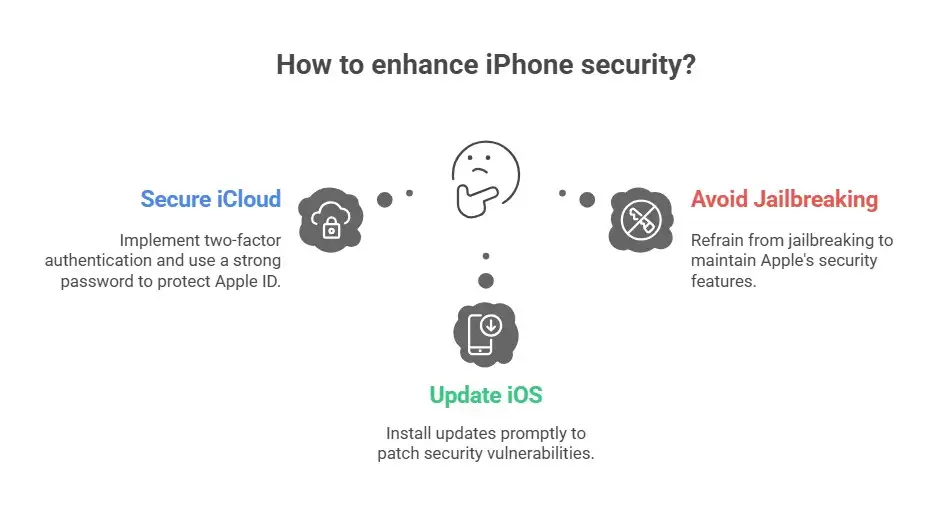
How can I keep hackers from getting my phone number?
Your phone number has quietly become one of the most important parts of your online identity. Hackers who get into it can change your passwords, pretend to be you, or steal your accounts through SIM-swap attacks.
Here's how to protect yourself from that:
• Add a SIM PIN: Go to your settings and turn on a special PIN for your SIM card. Even if someone steals or clones your SIM, they can't turn it on without it.
• Don't give out your number to too many people: Don't put it on public sites. Instead, use secure messaging apps like Telegram or Signal to talk to each other.
• Call your carrier: Ask them to require a PIN or security question before they can make changes to your account.
How to Keep Your Phone Safe from Theft
If someone steals your phone, digital security doesn't mean much. It's just as important to keep the device safe.
• Always lock your screen. Use a biometric lock, like a fingerprint or Face ID, and set the auto-lock timeouts to be short.
• Let people track you from afar. You can use "Find My Device" on Android or "Find My iPhone" on iOS to quickly find or erase your phone.
• Don't leave your phone unattended. Especially in public places like airports or cafés.
• Make backups often. Put your data in encrypted cloud storage so that it stays safe even if you lose your phone.
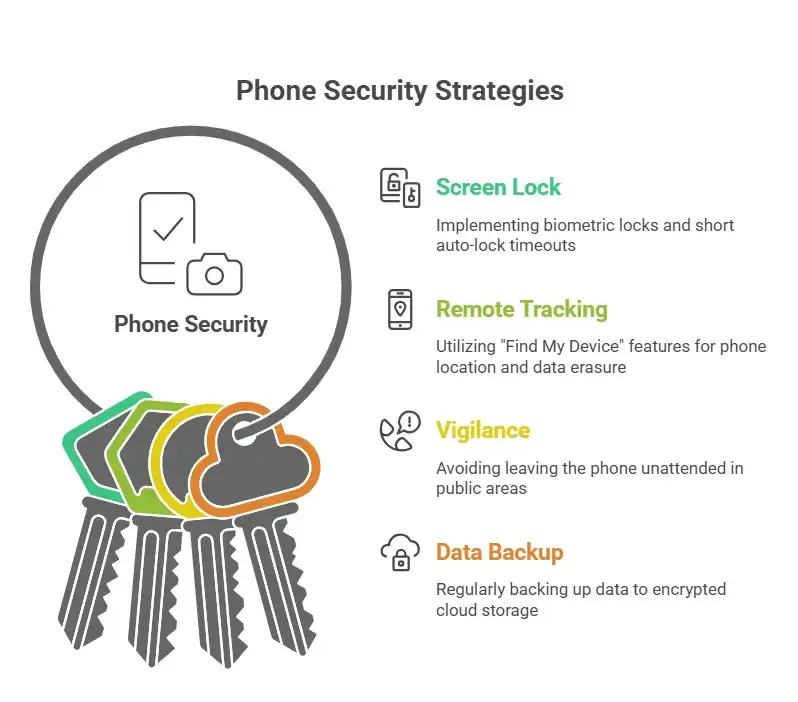
One missed update costs a lot of money.
In early 2025, a freelance designer in Los Angeles didn't pay attention to a few system updates because they thought they were "just performance tweaks." Within weeks, her Android phone began acting strangely: battery drops, random restarts, and phantom texts.
An old security hole let in a harmful app that synced her contact list to a server far away. It took days to clean up the mess and weeks to get her accounts back. It all could have been avoided with one simple update.
What do you think? Cybersecurity often seems to be there but isn't.
The Mindset Behind Phone Hacking
Hackers don't just take advantage of software; they also take advantage of people. Their best tools are curiosity, ease of use, and too much confidence. That "urgent" message telling you to check your account? It's meant to get you to act quickly without thinking.
That's why being aware is just as important as any security setting. Hackers have a harder time getting you to do what they want if you are more skeptical online.
Threats that could happen in 2025
The next wave of mobile attacks has already begun:
• Phishing that uses AI. Scammers now use generative tools to make fake business messages look real.
•bad QR codes. A quick scan at a café or event could take you to infected sites.
• Spyware that comes with real apps. Some apps gather data about your location and microphone without your knowledge, calling it "analytics."
Stay on your toes, read permissions carefully, and don't click or scan anything you don't know about right away.
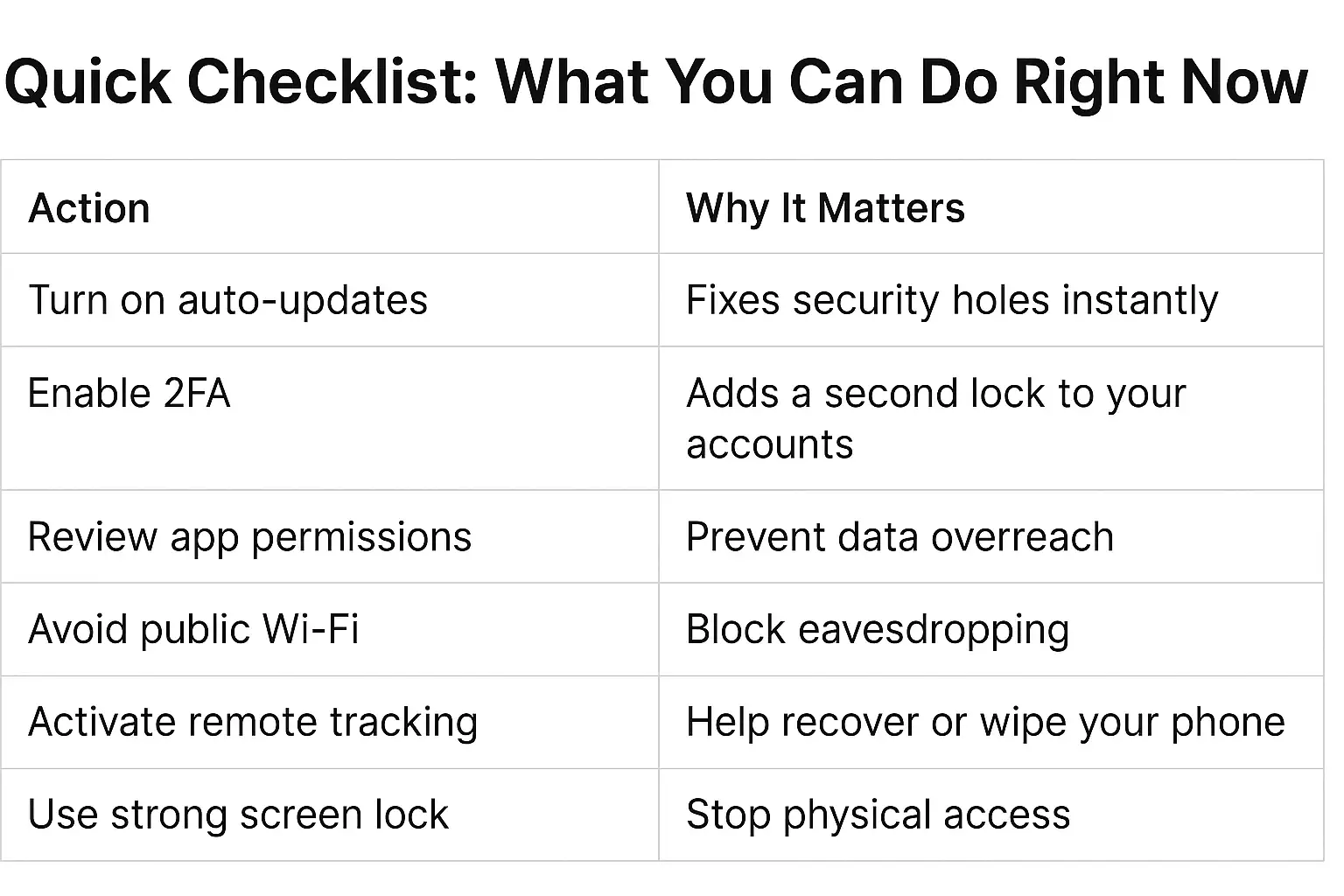
Final Thoughts
You Are in Charge of Your Digital Safety
Hackers will keep getting better at what they do, just like technology will. But in the end, what brand your phone is doesn't matter as much as how you use it. Every time you get an update, review your permissions, or have doubts, you make your privacy stronger.
If you've been wondering, "How can I keep hackers from getting into my phone?" Remember that security isn't a one-time thing. It's a small, regular habit that is well worth it.
Your phone has everything you need. Keep it safe.
You can also read these important cybersecurity news articles on our website.
· Apple Update,
Share this :